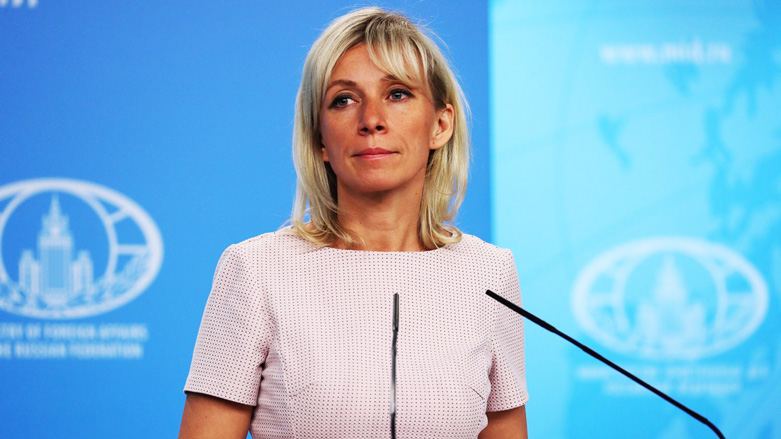Russia: US establishing ‘pseudo-government’ in Syria

ERBIL (Kurdistan 24) – Russian Foreign Ministry Spokesperson Maria Zakharova on Thursday accused the US government of attempting to create a “pseudo-government” in northern Syria.
"Meanwhile, the northeast of Syria remains under de facto control of the US military who continue to flirt with local armed groups, buying their loyalty with arms deliveries. Thus a process is in full swing in the Trans-Euphrates area of establishing pseudo-government structures which are not legitimate under Syrian law,” she said.
The US announced on Aug. 17 that it had secured $300 million from coalition partners for Syrian stabilization initiatives, including Saudi Arabia, and that it would redirect $230 million in frozen funds originally intended for Syria to other priorities.
Zakharova characterized US stabilization programs in Syria as “funding anti-government structures” and said the US had “shifted the responsibility on their allies.”
“Now using money from the other members of the Washington-led coalition – Europeans and Arabs – the United States embarked on restoring and upgrading oil-producing infrastructure in the northeast of Syria and essentially began plundering Syria’s national wealth,” Zakharova said, accusing the US of violating Syria’s sovereignty, despite previous pledges that it supports the unity of Syria.
“We would like to understand how that stance corresponds to our partners’ practical steps that we are observing on Syrian territory,” she added.
Timur Akhmetov, a researcher at the Russian International Affairs Council, told Kurdistan 24, “Obviously, Russia is not happy with US reinforcing its presence in Syria, because this may give the Kurds the impression that Americans are there to stay and therefore let them be less cooperative with Damascus.”
Recently, Kurdish groups in Syria have been holding talks with Damascus to reach a solution to the national crisis.
“I suppose that Russia may have wanted to reach an understanding with US that it would not stay for a long period of time in Syria. To build a trust with US, Russia may propose some new arrangements or cooperation over reconstruction and demining of major settlements under PYD (Democratic Union Party) control, Iranian presence along the Israeli border, or fight against IS in eastern Syria,” he added.
In the past, Syrian Kurds maintained positive relations with both Russia and the US, Farhad Patiev, Co-Chairman of the Federal National-Cultural Autonomy of Kurds in Russia, told Kurdistan 24.
“But the Kurds refused to choose between them, understanding the need for equal involvement of Russia and the United States in resolving the Syrian crisis,” he said.
But since Russia supported a Turkish offensive on the Kurdish town of Afrin in January, relations between the Kurds and Russia have been strained.
“Afrin pushed the Kurds towards one [the US], and pushed him away from the other,” he said.
Russia also remained silent over Turkey’s control of other areas in northern Syria.
“The United States represents a greater long-term threat to Russia than Turkey. Russia has managed its competition with Turkey over hundreds of years,” Nicholas A. Heras, a Middle East security analyst at the Washington-based Center for a New American Security, told Kurdistan 24.
“A Turkish protectorate in northern Syria is a nuisance to Russia, but not a mortal threat. Moscow's nightmare is an American commitment to staying in Syria, which is a wild card that Russian planning did not anticipate.”
The American presidential envoy to the US-led coalition against the Islamic State (IS), Brett McGurk, said last week that the US would not be leaving Syria any time soon.
"We’re remaining in Syria. The focus is the enduring defeat of ISIS,” he said.
Moreover, he stated that, after the territorial defeat of IS, the US would continue to support the training of local forces.
Editing by John J. Catherine
